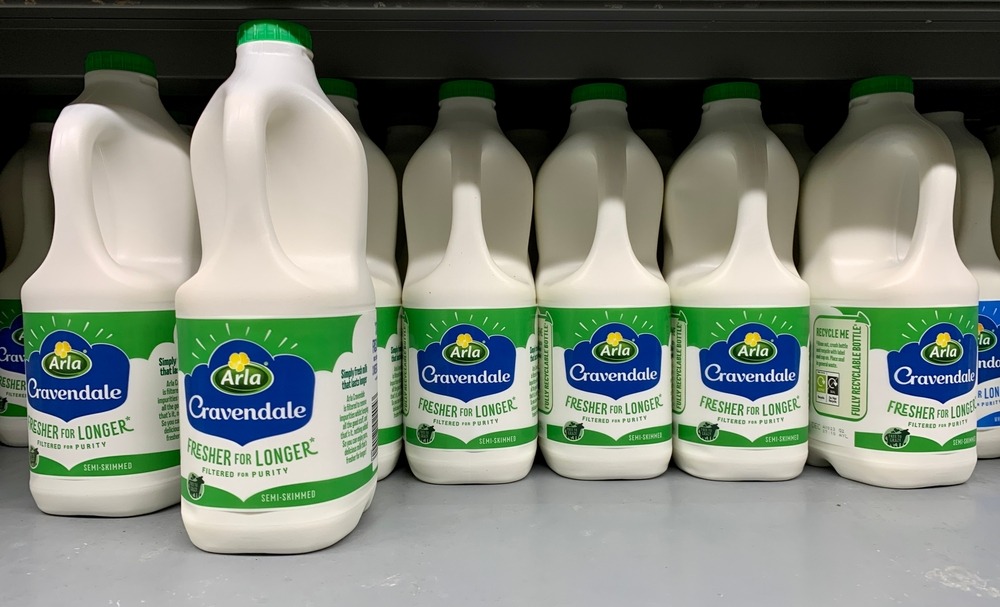Arla Milk Boycotts: The Controversy Behind Bovaer.
Arla Foods has asserted that the Boevar cattle food supplement will not enter the human food supply, despite claims from conspiracy theorists targeting the farmer-owned cooperative.
A recent initiative to incorporate a methane-reducing additive into cattle feed has led online consumers to threaten a boycott of three prominent supermarket chains.
Arla Foods revealed the trial of this supplement last Tuesday, aiming to mitigate the emissions generated by cows within their production processes.
The feed additive, referred to as Bovaer, will be tested on 30 farms across the United Kingdom, as announced by the company in a post on X last week, which has garnered nearly six million views. Arla describes this initiative as a significant opportunity to lower emissions on farms.
As the largest farmer-owned dairy cooperative in the UK, Arla is collaborating with Aldi, Morrisons, and Tesco for this trial.
The announcement has garnered 13,000 responses on X, prompting numerous individuals to dispose of milk in toilets and discard tubs of Lurpak, asserting that Bovaer is harmful and poses risks to cows, farmers, and consumers alike.
Why is Bovaer being tested and what is it?
Arla has indicated that the use of Bovaer could lead to a reduction in methane emissions from cattle by as much as 27 percent.
A report published by the UK government in 2022 identified the reduction of methane emissions as one of the most rapid and cost-effective strategies to limit the increase in global temperatures to 1.5°C. Methane is responsible for roughly 13 percent of the net greenhouse gas emissions in the UK.
In 2021, the most recent year for which data is publicly accessible, agriculture was responsible for 49 percent of methane emissions in the UK, as reported by the Department for Environment, Food & Rural Affairs (Defra).
The manufacturer of the supplement, DSM-Firmenich, explains that Bovaer inhibits the enzyme in the cow’s rumen that facilitates the conversion of hydrogen and carbon dioxide into methane. Consequently, this results in a lower release of methane into the atmosphere by the cow.
The company's website asserts that Bovaer has been "proven safe for animal, farmer, and consumer." In addressing online criticism in the UK, the firm cites 150 trials conducted globally and 85 articles published in peer-reviewed journals that support its effectiveness.

What has caused the backlash?
Arla's online statement incited significant outrage, especially among climate change skeptics and conspiracy enthusiasts, as the product was inaccurately associated with software magnate Bill Gates.
A comment on the post on X, which received over 14,000 likes, stated: “You are f****** insane if you think adding toxic chemicals to cows food that could cause harm to the farmers and the cows will help alter the climate of the planet I will be avoiding ALL of your products.”
“Cows have been farting since cows existed, and the climate has always changed,” one consumer wrote.
Another stated that the company is making a “huge mistake”, adding: “Once word gets around people will avoid your products. We do not want that poison in our food. Change your plans or go bankrupt.”
A fourth wrote: “I used to regularly buy your products (mostly protein shakes and yoghurts), but won’t be any longer until you stop using Bovaer. I will also be boycotting Tesco, Morrisons and Aldi while they continue to play a part in this. Anyone with me?”
Calls for boycotts against Tesco, Morrisons, and Aldi have garnered considerable attention, with many individuals also utilizing TikTok to encourage participation in the boycott. Viral videos circulating online depict individuals disposing of milk in toilets and sinks as a protest against consuming products produced by Arla.
DSM Firmenich was compelled to clarify that Bill Gates, who has been the focus of various conspiracy theories, has no association with the company. The firm stated, “Bill Gates is not involved in the development of Bovaer.”
Is Bovaer Safe?
DSM-Firmenich has announced that the UK Food Standards Agency has granted approval for the use of Boevar, citing "evidence that it does not harm the animals or negatively impact their health, productivity, or the quality of milk." The agency concluded that the product is safe for both animals and humans, and it effectively reduces methane emissions.
When used as directed, Boevar is "fully metabolized" by the cow, ensuring that it is "not present in milk or meat, thus eliminating any consumer exposure."
The company further states that there are no health risks associated with the substance, and it does not affect milk production or reproductive capabilities.
Arla Foods reaffirmed these assertions in a statement released to address the criticism. The statement further included: ”Alongside the 2,000 farmers across the UK who own Arla, we work hard to produce healthy & quality food every day. We work to ensure that this is done safely, whilst also working to reduce our impact on the environment.”
The chair of the National Farmers’ Union Dairy Board, Paul Tompkins, expressed that uncertainties persist regarding the "long-term efficacy" of Boevar and its effective application on farms. “This latest trial, on a product which has already been approved by the Food Standards Agency as safe for consumers, could help provide some of this evidence,” he added.
The rollout of Bovaer has sparked significant controversy, raising questions about its long-term implications for animal welfare, environmental efficacy, and consumer safety. Despite assurances from Arla Foods and DSM-Firmenich, skepticism remains, fueled by concerns over the additive’s potential effects on cows and distrust of corporate motivations.
LATEST: Everton's New Era Begins with Friedkin Group Takeover.
Public backlash, including boycotts and misinformation campaigns, underscores the challenges of gaining widespread acceptance for such initiatives. While the goal of reducing methane emissions is commendable, the controversy highlights the need for greater transparency, comprehensive long-term studies, and open dialogue to address public concerns and ensure that sustainability efforts are genuinely beneficial and inclusive.














